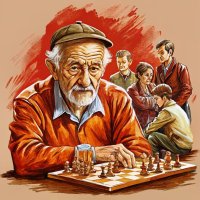
From Prague to the Chess World
19.04.2025 12:36 | NewsWhat began as a typical, friendly World Senior Team Championship in Prague has ended in frustration, outrage, and an open letter to FIDE that now symbolizes a deeper crisis. A crisis named: The Fair Play Commission.
“The entire world – except a few fools in FIDE leadership – understands that the World Senior Championship isn’t a top-tier event. It’s a social gathering where old friends reunite. And here we are humiliating, suspecting, and searching them like criminals,”
said one arbiter involved in the Prague tournament.
FIDE has been under fire for some time now due to what many consider increasingly harsh and, frankly, absurd anti-cheating measures. From banning hearing aids to wallet inspections and forcing players out of the hall as soon as they finish their games, the joyful spirit of chess events is being crushed under bureaucratic paranoia.
The Letter That Shook the Chess World
The loudest voice of protest came from IM Nigel Povah, manager of the England senior team. In a letter to FIDE President Arkady Dvorkovich, Povah detailed two troubling incidents from Prague:
After a 15-move draw, two players were randomly selected for an anti-cheating check. The search lasted 30 minutes – despite there being no rational suspicion of wrongdoing.
A female player, after winning her first four games, was reportedly strip-searched by two female Fair Play staff. According to those who witnessed it, the player and her teammates were deeply shaken.
“Such actions are not protective – they are punitive, excessive, and completely out of proportion,” Povah wrote. He also questioned whether there had ever been a single known case of cheating in senior chess. (Spoiler: there hasn’t.)
When Arbiters Start Reporting Arbiters
Perhaps even more absurd is the power struggle between arbiters and the Fair Play Commission. In Prague, some arbiters attempted to ease the experience for the senior players. However, they were reported by fellow Fair Play officials to the then-chairman Yuri Garrett, who responded by ordering even stricter controls.
The result? Long queues, humiliating searches, rising tensions, and pure chaos.
“One Fair Play arbiter said the job helped him qualify for the Olympiad – but that he’d never do it again. Nobody wants to be a 'useful idiot' hated by players, organizers, arbiters, and even their own boss,”
said one witness.
The Backlash Is Growing
The Prague incident is far from isolated. Thirteen veteran FIDE tournament organizers have written to express their reluctance to host further events due to the financial and operational burdens of Fair Play regulations. A group of arbiters, including chief arbiters of World Championship matches and Olympiads, have lodged formal complaints. Even the Mitropa group of European federations has voiced concern.
And then there’s Malcolm Pein, columnist for The Daily Telegraph and one of the most respected voices in chess journalism. In a fierce editorial for CHESS magazine, Pein compares the Fair Play Commission to a Soviet-style secret police.
“The Fair Play Commission behaves like the KGB. Regular arbiters are now subordinate to a new, more secretive authority. Chess is no longer about joy – it’s about control,”
Pein writes.
He shares personal stories from the 2022 Olympiad in Chennai – like being reprimanded by Garrett for chatting with GM Ivan Sokolov in a corridor outside the playing hall, or seeing a Fair Play operative try to forcibly remove Shakhriyar Mamedyarov from his chair after a tough loss.
“Ask yourself – who benefits from this? Who gains when the joy, trust, and respect that define chess are stripped away?”
What Needs to Happen
Following mounting pressure, Yuri Garrett was removed as Chairman of the Fair Play Commission. However, the structure and authority of the Commission remain untouched.
Critics are calling for drastic reform:
Merge the Fair Play Commission with the Arbiters Commission.
Focus on technology – let a small team monitor computer-assisted cheating threats.
Return control to arbiters, as is still the norm in non-FIDE events.
Some go even further, demanding the complete abolition of the Commission and a formal apology to the global chess community.
The FIDE Council is set to meet on March 21, and many are waiting to see whether meaningful action will follow.
